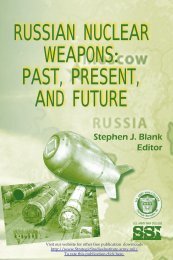The United States and China in Power Transition - Strategic Studies ...
The United States and China in Power Transition - Strategic Studies ...
The United States and China in Power Transition - Strategic Studies ...
You also want an ePaper? Increase the reach of your titles
YUMPU automatically turns print PDFs into web optimized ePapers that Google loves.
power <strong>and</strong> guns <strong>and</strong> to “mechanized warfare” with<br />
the employment of tanks, battleships, <strong>and</strong> airplanes),<br />
<strong>and</strong> determ<strong>in</strong>ed that <strong>Ch<strong>in</strong>a</strong> must take measures to<br />
catch up with this RMA <strong>in</strong> the <strong>in</strong>formation age. 222<br />
<strong>The</strong> other catalyst for change was the Taiwan Strait<br />
crisis of 1995-96, dur<strong>in</strong>g which the <strong>United</strong> <strong>States</strong> made<br />
a strong show of force <strong>in</strong> the Western Pacific, perhaps<br />
the largest s<strong>in</strong>ce World War II. Ch<strong>in</strong>ese leaders suddenly<br />
found themselves confront<strong>in</strong>g the Taiwan <strong>in</strong>dependence<br />
movement (prior to that time, the Taiwan<br />
issue was mostly an unf<strong>in</strong>ished war between the CCP<br />
<strong>and</strong> KMT <strong>and</strong> Taiwan <strong>in</strong>dependence was not <strong>in</strong> question),<br />
but its ability to deter Taiwan’s push for <strong>in</strong>dependence<br />
<strong>and</strong> likely U.S. military <strong>in</strong>tervention abhorrently<br />
<strong>in</strong>adequate. To protect its claimed core <strong>in</strong>terests,<br />
<strong>Ch<strong>in</strong>a</strong> must upgrade its military power immediately.<br />
F<strong>in</strong>ally, the U.S.-<strong>Ch<strong>in</strong>a</strong> power transition also surfaced<br />
<strong>in</strong> time to rem<strong>in</strong>d the Ch<strong>in</strong>ese leaders that they<br />
needed a strong military to support <strong>and</strong> protect <strong>Ch<strong>in</strong>a</strong>’s<br />
rise to power. Although Ch<strong>in</strong>ese leaders spoke<br />
out loud their proposition for <strong>Ch<strong>in</strong>a</strong>’s peaceful rise,<br />
they had every reason to observe the old say<strong>in</strong>g that,<br />
if you want peace, prepare for war.<br />
<strong>The</strong>se challeng<strong>in</strong>g situations required <strong>Ch<strong>in</strong>a</strong>’s<br />
policy adjustment. Back <strong>in</strong> the early days of <strong>Ch<strong>in</strong>a</strong>’s<br />
economic reform, Deng Xiaop<strong>in</strong>g put <strong>Ch<strong>in</strong>a</strong>’s military<br />
modernization on the back burner. He was on record<br />
as <strong>in</strong>struct<strong>in</strong>g <strong>Ch<strong>in</strong>a</strong>’s military leaders that military<br />
modernization had to wait until <strong>Ch<strong>in</strong>a</strong> quadrupled<br />
the size of its economy, hopefully by the end of the<br />
20th century. 223 However, the new circumstances dictated<br />
that <strong>Ch<strong>in</strong>a</strong> set its military modernization <strong>in</strong> motion<br />
ahead of schedule. “To build a prosperous nation<br />
with a strong military” (富国强军) was <strong>Ch<strong>in</strong>a</strong>’s answer<br />
to the challenges. 224<br />
190

















